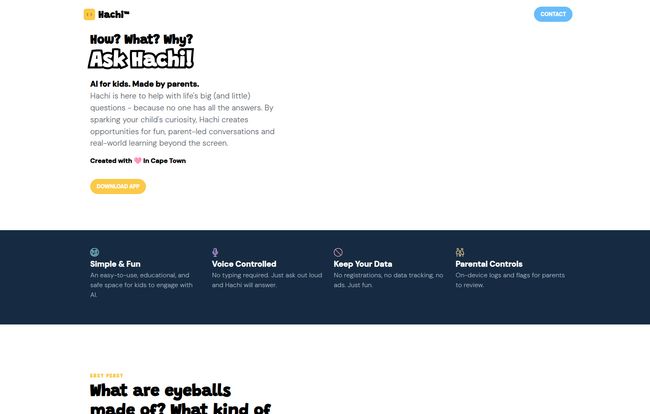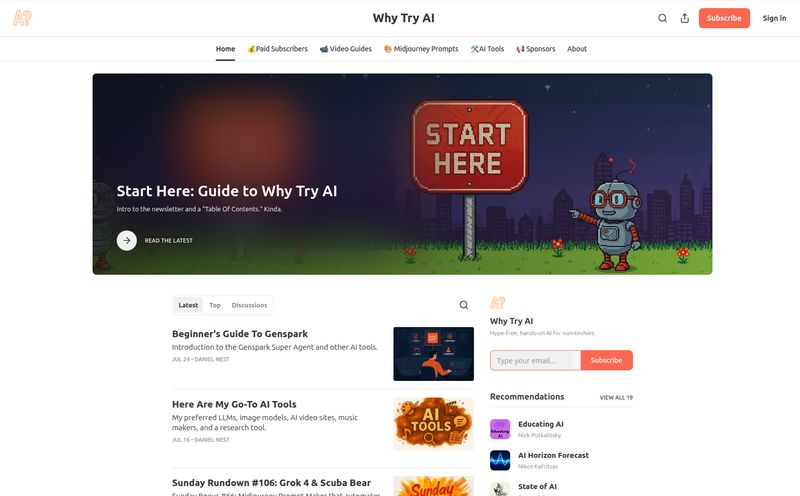If you're a parent, you know the drill. The endless, unrelenting, beautifully maddening stream of questions. “Why is the sky blue?” is just the warm-up act. Before you know it, you’re getting hit with, “What are eyeballs made of?” or “What kind of plastic is in Lego?” And honestly? Sometimes, I just don’t have the answer. Or the energy.
For years, the go-to solution has been a quick, furtive Google search while your kid’s attention is momentarily elsewhere. But now we live in the age of AI. It’s everywhere. And as someone who’s been neck-deep in SEO, traffic trends, and the digital world for years, the thought of letting my own kid loose on ChatGPT gives me a cold sweat. It's a powerful tool, sure, but it's also the Wild West—full of biases, inappropriate content, and let's not forget the data-hoovering. No thank you.
So when I stumbled upon a tool called Hachi, my curiosity was definitely piqued. The tagline alone—“How? What? Why? Ask Hachi.”—felt like it was speaking directly to my life. Made by parents, for parents. That’s a bold claim. Let’s see if they back it up.
So, What Exactly is Hachi AI?
At its core, Hachi is a voice-controlled AI designed specifically for children. Think of it less like a miniature search engine and more like a friendly, knowledgeable robot buddy. The whole point isn't to be a digital babysitter that pacifies your child with endless content. Instead, it’s designed to be a springboard. A catalyst. Your kid asks a question, Hachi provides a simple, safe, age-appropriate answer, and that, in turn, is supposed to spark a real-world conversation between you and your child.
The creators, based out of Cape Town, seem to have built it from a place of genuine parental concern. They talk about wanting to avoid the pitfalls of most kids' tech: privacy issues and mindless screen addiction. It’s a philosophy I can get behind. In an industry obsessed with engagement metrics and ad revenue, building something that encourages kids to look up from the screen is… well, it’s refreshing.

Visit Hachi
It’s about giving them a safe, walled garden to explore their curiosity in, without you having to worry they’ll accidentally stumble upon the dark corners of the internet. A noble goal, but the devil is always in the details.
The Features That Actually Matter to Parents
Let's cut through the marketing fluff. An app can have a great mission statement, but if the features are clunky or miss the mark, it’s useless. I looked into what Hachi actually does, and a few things stood out.
A Walled Garden of Knowledge: Age-Appropriate Answers
This is the big one. Hachi doesn’t just pull an answer from the web and spit it out. It’s curated. The example they give is a kid asking, “What are eyeballs made of?” You or I might get a dense, jargon-filled medical explanation from Google. Hachi, on the other hand, is designed to give an answer a six-year-old can actually understand. This is crucial. It’s the difference between learning and confusion. It’s like having a patient, digital older sibling who knows just enough to be helpful but not enough to be overwhelming.
You’re Still the Captain: Real Parental Controls
Hachi comes with a dashboard for parents. This isn't just a gimmick; it’s a genuinely useful tool. You can see the questions your child has been asking. For me, this is gold. It’s a window into their little world. What are they thinking about? What are they curious about right now? It’s a cheat sheet for dinner table conversation.
More practically, you can also set limits on how many questions they can ask per day. I love this. It prevents the app from becoming a crutch and encourages the child to be selective with their curiosity. It subtly teaches that this is a tool, not a toy to be used endlessly. A very smart, very necessary feature.
Your Family's Data Isn't the Product
Okay, this is where I get really excited. Hachi’s privacy policy is front and center: No data tracking. No ads. Just fun.
Let that sink in. In 2024, a tech company building a product for kids and not trying to monetize their data or bombard them with ads is a unicorn. It's a massive differentiator from using a smart speaker like Alexa or Google Home, which are, let's be honest, data collection devices for two of the world's largest advertising companies. The fact that Hachi is built on a foundation of privacy is probably its single strongest selling point for any tech-savvy parent.
Just Talk to It: Voice-Controlled Simplicity
The interface is voice-first. A kid taps a button and asks their question. Hachi listens and replies. For little ones who are still mastering reading and writing, this is perfect. It removes the barrier of a keyboard and makes the interaction feel more natural and conversational. It lowers the friction, making it accessible for a wider age range.
My Honest Take: The Good, The Bad, and The Realistic
After digging into it, I have some thoughts. Hachi feels like a tool built with a very specific, and I think very good, intention. It’s not trying to compete with the big AI models. It's not trying to be everything to everyone. It's carving out a very specific niche.
The biggest strength is its philosophy. It's a digital training wheel for AI. It introduces the concept of asking a machine for information in the safest way possible. Some might see its limited functionality as a 'con', but I see it as its main feature. It doesn't write essays, it doesn't code, it doesn't generate images. It answers simple questions. That focus is what makes it safe.
The reliance on parental involvement is another thing some might see as a negative. “You mean I have to… talk to my kids about what they’re learning?” Yes! That’s the entire point. Hachi isn’t a replacement for parenting; it’s an accessory for it. It’s there to start the conversation, not end it.
The Million-Dollar Question: What's the Price Tag?
And here we hit a bit of a snag. As of writing this piece, the pricing information is nowhere to be found. The main website doesn't list it, and any links that look like they might lead to pricing result in a “Page Not Found” error.
What does this mean? My best guess is that Hachi is still in a Beta phase or preparing for a full launch. This is common for new apps. They might be gathering feedback before they finalize a pricing model. Will it be a monthly subscription? A one-time purchase? It's hard to say. Personally, for a tool this focused on privacy, I'd happily pay a reasonable subscription fee over a “free” app that sells my kid’s data to the highest bidder. I'll be keeping an eye on their site and will update this if and when that information becomes available.
Who is Hachi AI Really For?
Hachi isn't for everyone, and that's okay. This is a tool for a specific type of parent:
- Parents of curious kids, probably in the 4-to-9-year-old range.
- Parents who are wary of Big Tech and deeply concerned about data privacy.
- Parents who want to be involved in their child's digital life, not outsourced from it.
- Parents looking for a way to manage screen time constructively.
It’s not for the parent who wants an app to keep their kid busy for an hour, no questions asked. It’s not a digital babysitter. It’s a conversation starter, and it works best when the parent is part of the loop.
Final Thoughts
Look, the digital world for kids is a minefield. As parents, we're constantly trying to find the balance between protecting them and preparing them for the world they're growing up in. Hachi AI feels like a genuinely thoughtful attempt to help with that balancing act. It’s not perfect, and its current mysterious pricing is a bit of a question mark, but its core principles are spot on.
It’s a safe space for curiosity, a champion of privacy, and a tool designed to bring families together rather than push them apart. In the crowded market of kids' apps, that's a mission worth paying attention to. It’s one of the most promising approaches to “AI for kids” that I’ve seen in a long while.
Frequently Asked Questions About Hachi AI
- Is Hachi truly safe for my child to use?
- Based on its design, yes. Hachi provides age-appropriate, curated answers and operates within a closed system. Its commitment to no data tracking and no ads makes it one of the safer digital environments for a child.
- Can I see what my child asks Hachi?
- Yes. The parental controls feature a dashboard where you can monitor your child's questions, which is great for understanding their interests and for starting conversations.
- How is Hachi different from using Alexa or Google Assistant?
- The key differences are privacy and purpose. Hachi does not track user data for advertising, unlike major smart assistants. It's also narrowly focused on answering children's questions to spark curiosity, rather than being a general-purpose assistant that can browse the open internet or control smart home devices.
- What devices does Hachi work on?
- The website features a prominent "Download App" button, which strongly suggests it is a mobile application for smartphones and tablets, likely available on both iOS and Android platforms.
- Is Hachi AI free?
- Currently, the pricing information is not publicly available on their website. It could be in a free beta period, or they may be planning a subscription or one-time purchase model for the full launch. It's best to check their official site for the most current information.
Reference and Sources
- Hachi Official Website: https://www.hachi.ai/



